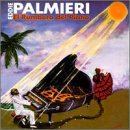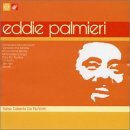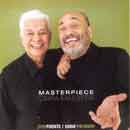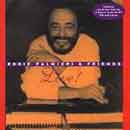|
Tito
Puente - Celia Cruz - Eddie Palmieri
"The Royalty of Salsa" 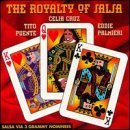
Click Above Buy for $13.99 Ship Immediately, In Stock!! |
The world has long admired the Harlem born, seven-time GRAMMY® Award winning Palmieri as one of the foremost Latin pianists of the last half-century. His ability to fuse the rhythms of his Hispanic heritage with the jazz influences of Thelonius Monk and McCoy Tyner made him an immediate hit when he played New York's Palladium Ballroom in the '50s and '60s. He has continued to roll on with stylistic innovations over the years, creating classic Tico albums and later mixing salsa with R&B, pop, rock, Spanish vocals and more jazz improvisation. Now that Tito Puente is gone, the 66 year-old accepts the passing of the baton and is happy to consider himself a Latin jazz ambassador to the world.
"Tito helped extend this music to all parts of the world, and as long as I am still healthy and energetic, I will continue to record and tour to keep this wonderful legacy alive," says Palmieri. "The rhythms continue to excite because they keep evolving, just as they did when the African captives who started them were taken to the Caribbean. It's a matter of finding new ways to utilize these complicated patterns and then create exciting new arrangements for my ensemble."
"We've been together for many years and work like a good baseball team," adds Palmieri of his band. "What matters is how we take care of specific synchronizations, and a lot of that takes place first in my head. The structure is there, and I look at it sometimes as a mathematical equation. But then, it must translate to emotion, and that's where the reaction of the audience comes in." He jokes about choosing the title of this album, "I like the sound of 'Ritmo Caliente on Concord Picante.' It is hot and spicy, like the music." On the CD, Palmieri combines hard core salsa and hard Latin jazz with his classical and chamber string influences. "Concord has been wonderful in offering me this ability to keep taking musical risks," he comments. But the casual fan of Latin jazz may need to consult a music encyclopedia to understand all the classic forms that lie behind Ritmo Caliente's multitude of charms.
The mambo "La voz del Caribe" comes at us in distinct sections, beginning with pounding, hypnotic piano chords and later spinning us around with a playful call and response by a small vocal "coro" and the trumpets of Brian Lynch and John Walsh. "Grandpa Semi-Tone Blues" is a Latin jazz montuno, but begins with a boogie based riff that sounds like the treble bass pattern known as gaujeo-semantics aside, the feisty interaction here between Palmieri and Karen Joseph's flute is captivating. "Billie," named for both Billie Holliday and Palmieri's dog with the same name, resonates with the beat of the Mozambique with layers that spark images of Tito. Palmieri gives Mayito Fernandez's '60s song "Lazaro y su Microfono" a seductive cha cha cha treatment, then recalls his dance hall days with a lightning quick mambo flute-brass-piano-percussion jam that lives up to Palmieri's expectations for Ritmo Caliente-hot and spicy!
The gentle, classically inspired and orchestral enhanced "Tema para Renee" is the romantic cheek-to-cheek piece, with a caress of strings beyond the pace of a classic bolero and a bongo-driven matrillo beat. Back to sizzling speed, "Leapfrog to Harlem" is a horn blasted, jazzy piano driven ode to Palmieri's home neighborhood, a place he insists is undergoing a powerful new renaissance. Then comes Ritmo Caliente's most ambitious piece, "Gigue (Bach Goes Bata)," where he bridges Bach with bata (in 6/8, with some signature variation) in a chamber recital with flute and horn drenched fire. "Dime" offers a sweet, sexy mambo-son vibe, with Herman Olivera's vocals lush and prominent, while "Sujetate la Lengua," a Latino song about the perils of gossip, is witty, lively and uptempo-a mix of adventure and fun. Palmieri admits he could go on playing for hours, but this time he leaves us with a spirited Latin big band boom of "Lo Que Triago es Sabroso," which finds his guajeos revolving and revolving, pushing energy to its limit.
Eddie Palmieri's effusive personality and keenness for a wide range of historical, scientific and musical topics matches perfectly a career which has found him shaping his own agenda, jumping from structured dance records to free jazz. The constant has been his creation of works that nudge the cause of Latin jazz forward while fostering a sizable, remarkably faithful and always growing audience. He took classical piano lessons for a while and performed at Carnegie Recital Hall at age 11, but prefers telling the unofficial version of how he came to play piano like his older brother Charlie, who led tipico Latin dance ensembles: "I wanted to be his drummer, and carried a box of heavy timbales around for a while, but my mother pointed out that he could be a professional musician and not have to carry anything around. I sold the drums back to my uncle and have been a pianist ever since."
Gathering inspiration from Machito, Tito Rodriguez (whose band he eventually joined), Tito Puente and other stars of Manhattan's Palladium (the "Home of the Mambo," at 53rd Street and Broadway), Palmieri made his professional debut with Johnny Sequi's orchestra in 1955. He organized his Conjunto La Perfecta after a chance meeting with late trombonist Barry Rogers at the Triton club, another Nuyorican dance club of the time. The two instituted a two-trombone, flute, piano, bass and Latin percussion band that quickly gained acclaim and popularity over then-common trumpet dominated Latin dance ensembles. In 1973, he won the GRAMMY Award's first tropical music accolade, later returning to his dancehall roots before coming back to Latin jazz full force with 1994's recording Palmas. That year, he helped convinced NARAS to establish the Latin Grammy.
"I am so excited by the opportunities Concord has given me, but at first I was not sure about making my first album for the label an update of the sound of La Perfecta-it is so hard to improve upon the past," he says. "But then I went ahead and did it as a tribute to Barry and enjoyed the spiritual element of that and its ability to enlighten people about the history of the Latin jazz I love so much. I am always learning and this spirit of investigation keeps me vigorous and excited about doing more." With Ritmo Caliente, he continues his journey of exploration with aplomb.
Berkeley Agency/Eddie Palmieri
Eddie Palmieri
~ Salsa Musician Legend ~ Piano Player ~ JustSalsa. ...
JazzHouston | Jazz News | Exclusive Interview With Eddie Palmieri
